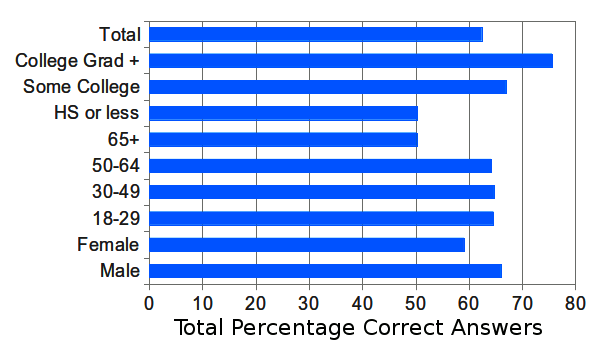Public Understanding of Science
May 20, 2013
Since we live and work in a world that's now dominated by
technology,
non-scientists need to have a basic knowledge of
science. This should be true especially for our
elected government officials, and that's why former
Alaskan Senator Ted Stevens' understanding of the
Internet as a "
series of tubes" became an
Internet meme. Perhaps it's our fault for calling high
bandwidth channels, "big pipes." Also, half a century ago, there was serious
development of a system to carry
telecommunications in pipes -
microwave waveguides.[1]

If the Internet really was a series of tubes, our routers might look something like this.
Ted Stevens may have been remembering the often taught analogy between electrical circuits and plumbing, where voltage is pressure and current is flow.
(Via Wikimedia Commons.)
The
common man needs some scientific knowledge to understand global issues, such as
climate change and diminishing
water resources; and personal issues about
health and
nutrition. Science has decided quite a few health issues, such as the links between
smoking and
lung cancer,
obesity and
diabetes, and
lead poisoning and
nervous system damage in children. Now,
pregnant women know that they shouldn't consume
alcoholic beverages for fear of
fetal alcohol syndrome. You can only avoid wasting your money on
quack remedies when you can identify them for what they are.
The
Pew Research Center is one of many "
think tanks." Pew does
polling and
demographic analysis on a broad range of topics, including some related to science and technology. Included in the 209 items on its
topics page are about thirty that deal with science, technology and the Internet. Thus, the
Digital Divide can be found below
Demography on their topics list.
The Pew Research Center and
Smithsonian magazine developed a thirteen question science test and polled slightly more than a thousand
randomly-selected adults for their answers.[2] The questions are quite basic, consisting of four true/false and nine multiple-choice questions in many scientific disciplines, as paraphrased below. I scored 100%, and I would have been embarrassed if I hadn't.
Take the test at their web site, or just see the correct answers,
here.
• True/False - All radioactivity is man-made.
• True/False - Electrons are smaller than atoms.
• True/False - Lasers work by focusing sound waves.
• True/False - The continents on which we live have been moving their location for millions of years and will continue to move in the future.
• Against which type of solar radiation does sunscreen protect the skin
• Nanotechnology deals with things that are extremely...
• Which gas makes up most of the Earth's atmosphere?
• What is the main function of red blood cells?
• Which of these is a major concern about the overuse of antibiotics?
• Which is an example of a chemical reaction?
• Which is the better way to determine whether a new drug is effective in treating a disease?
• What gas do most scientists believe causes temperatures in the atmosphere to rise?
• Which natural resource is extracted in a process known as "fracking"?
The Pew Research web site gives a thorough analysis of the responses to each question. Surprisingly, the question about which gas is the major component of Earth's atmosphere was the one that had the most incorrect responses. In my opinion, the overall scores were quite good, as indicated in the following graph, although some commentators thought the results should have been better.[4]

There's been a lot of talk lately that a college education isn't worth the cost, so it's encouraging that college graduates had the highest scores. Old folks and less educated people had the lowest scores, and men scored somewhat better than women. (Graph by the author, rendered using LibreOffice, from Pew Research data.)
A somewhat harder quiz is offered by
The Christian Science Monitor at
this URL.[3-4] This quiz actually starts with the Earth atmosphere question. Although I scored 100% on the Pew quiz, I scored just 88% on the CSM quiz (44/50), primarily because I was careless. I actually got all the questions in the
life sciences correct, knowing about
eukaryotes and
Gregor Mendel's peas, but I slipped in my specialty area of the
physical sciences.
I said that zeta (ζ) was the usual term for the
coefficient of friction, not mu (μ). I must have had
zeta potential on my mind. Also,
nimbus as a
cloud designation means
precipitating, not
high altitude, as I answered. I should have remembered my
eighth grade science teacher, who told us we could remember this by saying "nimbus!" so it sounded like
thunder.
Nothing can beat the simplicity of
Isaac Asimov's two question
chemistry test. Asimov was a
professor of
biochemistry as well as a famous
science fiction author. His questions were these:
• What's a mole?
• Pronounce unionized.
Non-chemists would say a mole was a
subterranean animal, a
skin lesion, or a
character from a spy thriller. Chemists know a mole as an
Avogadro's number of
particles (usually
atoms or
molecules). Non-chemists would pronounce
unionized as
union-ized, not a chemist's
un-ionized.
References:
- J.C. Anderson, J.W. Carlin, D.J. Thomson and T.J. West, "WT4 Millimeter Waveguide System: Field Evaluation Test," The Bell System Technical Journal, December 1977, pp. 2157-2178 (11 MB PDF File).
- Pew Research Center, "Do you know more about science and technology than the average American?".
- Eoin O'Carroll, "Are you scientifically literate? Take our quiz," Christian Science Monitor.
- Phil Plait, "Lord of All I Survey," Bad Astronomy Blog, Slate, May 2, 2013.
Permanent Link to this article
Linked Keywords: Technology; scientist; science; elected government official; Alaska; Alaskan; Senator; Ted Stevens; Internet; series of tubes; Internet meme; bandwidth; development; telecommunications; microwave; waveguide; router; analogy; electrical circuit; plumbing; voltage; pressure; current; flow; Wikimedia Commons; common man; climate change; water; health; nutrition; smoking; lung cancer; obesity; diabetes mellitus type 2; diabetes; lead poisoning; nervous system; pregnancy; alcoholic beverage; fetal alcohol syndrome; quackery; quack remedy; Pew Research Center; think tank; opinion poll; polling; demographic analysis; topics page; Digital Divide; Demography; Smithsonian magazine; randomness; random; radioactive decay; radioactivity; electron; atom; laser; sound wave; continent; sunlight; solar radiation; sunscreen; skin; nanotechnology; gas; Earth's atmosphere; red blood cell; antibacterial; antibiotic; chemical reaction; drug; disease; temperature; natural resource; fracking; LibreOffice; The Christian Science Monitor; life sciences; eukaryotes; Gregor Mendel; pea; physical sciences; coefficient of friction; zeta potential; nimbus cloud; cloud; precipitation; precipitating; cirrus cloud; high altitude; eighth grade; thunder; Isaac Asimov; chemistry; professor; biochemistry; science fiction; author; mole; subterranean animal; melanocytic nevus; skin lesion; character from a spy thriller; Avogadro constant; Avogadro's number; particle number; particle; atom; molecule; trade union; union; ionization; ionized; WT4 Millimeter Waveguide System.